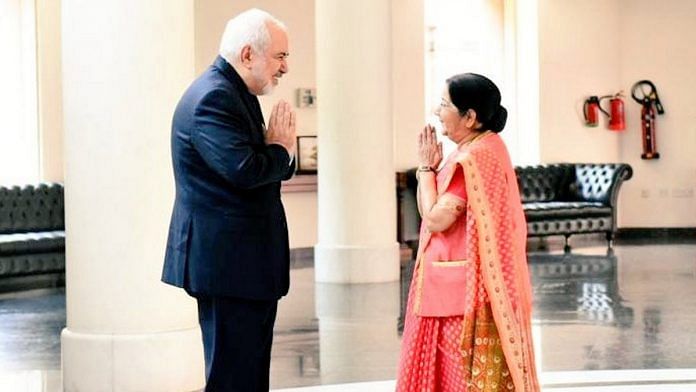New Delhi: India has told the Iranian foreign minister Javad Zarif, who landed in Delhi on a sudden visit, that the decision to resume oil purchases will be taken after the Lok Sabha elections, when a new government comes to power, multiple sources told ThePrint.
Diplomatic sources told ThePrint that Zarif urged New Delhi to resume its oil purchases from Iran. But External Affairs Minister Sushma Swaraj told him Tuesday that “a decision (on oil purchases) will be taken after the elections keeping in mind our commercial considerations, energy security and economic interests”, an Indian official said after the meeting between the two ministers.
India, under pressure from the US, had completely stopped its oil imports from Tehran since 2 May. The decision was taken after the expiry of a waiver, called Significant Reduction Exemption (SRE), that Washington had granted India in November last year.
New Delhi is Iran’s second-largest buyer of oil after China. India imports about 80 per cent of its entire crude oil requirement, and Iran accounts for 13 per cent of these imports, according to the Ministry of Petroleum and Natural Gas. Prior to the expiry of the waiver, India was buying over 3,00,000 barrels of oil every day from Iran.
Meanwhile, India is engaged in convincing the US to allow it to import the remaining shipments for which contracts have been signed.
Also read: US’ Iran oil waiver cancellation could impact India strategically, not economically
Iran’s partial withdrawal from JCPOA
The Iranian foreign minister also briefed India on the country’s future course of action on the 2015 Joint Comprehensive Plan of Action (JCPOA), commonly called the Iran nuclear deal, sources said.
This was part of its consultation with other countries such as Russia, China, Turkmenistan and Iraq over the last few days.
The deal was signed by Barack Obama’s US administration in 2015, along with the UK, France, China, Russia and Germany. However, President Donald Trump walked out of it as he found it inadequate and lacking in teeth to stop Iran from pursuing its nuclear ambitions. Additionally, he imposed multiple economic sanctions on Iran to disrupt its economy.
Last week, Iranian President Hassan Rouhani had announced in a televised speech that Iran would gradually reduce its “commitments” to the JCPOA, but would not withdraw from it completely, amid increasing tensions with the US in the Persian Gulf.
Rouhani had also threatened extreme consequences if the remaining parties of the JCPOA failed to ease banking and oil export restrictions in the next couple of months.
“He (Zarif) mentioned that 60 days’ timeline has been given to EU-3 and other parties to JCPOA for restoring the oil and banking channels,” the Indian official said. “India’s position on the JCPOA was reiterated. India would like all parties to the agreement to continue to fulfil their commitments and all parties should engage constructively and resolve all issues peacefully and through dialogue.”
‘Relations spanning millennia’
Meanwhile, Raveesh Kumar, spokesperson for the Ministry of External Affairs, referred to the India-Iran ties as “relations spanning millennia”.
Prime Minister Narendra Modi had visited Iran in May 2016 when both sides signed the pact to develop the Chabahar Port. President Rouhani visited India in February 2018, the first Iranian President to visit India in a decade since Mahmoud Ahmadinejad in 2008.
During Rouhani’s visit, both sides agreed to establish an international transport and transit corridor, along with Afghanistan.
Also read: India is said to plan paying five Iran banks for oil purchases




Iran Iraq Afghanistan and other Muslim countries have been there for many millennials.
Bharat and Islamic countries have their own stakes in international maze of intrigues and beliefs & behaviours.
Trade is life blood of all nations. Tills today Hindus have been enslaved & butchered up by Old new and ultra testament goons.
Hope there will be better tomorrow- it will not come till Hindus be bold strong and powerful. Will ever Hindus be muscular?
Iran is no friend in any stretch of imagination its a seller/buyer relationship and so it should be,
https://thewire.in/diplomacy/iran-khamenei-kashmir
For the First Time in Seven Years, Ayatollah Khamenei Rakes Up Kashmir
https://economictimes.indiatimes.com/news/economy/foreign-trade/rupee-turns-stumbling-block-in-trade-with-iran/articleshow/11200944.cms?from=mdr
The Iranians are a proud people, an ancient civilisation, also gifted, patient negotiators. The visiting FM knows India is at the fag end of its election, there could be either continuity or change. His visit comes when Iran has its back to the wall. Its lifeline, revenues from oil, is being squeezed remorselessly. India’s stoppage of imports is part of that economic pain, which is rippling down to the poorest citizens. If he is sent back empty handed, that will be noted. On the other hand, any solidarity and support shown at this fraught time would be remembered for a long time. 2. The United States is gearing up for an unjustified, unprovoked conflict. Whether Russia and China, working in tandem, can forestall that disaster remains unclear. India will be directly affected. We find ourselves in a position where we see the train wreck in slow motion and can do nothing about it. Hopefully, this is not part of the price to pay for getting that worthless creature designated a global terrorist.